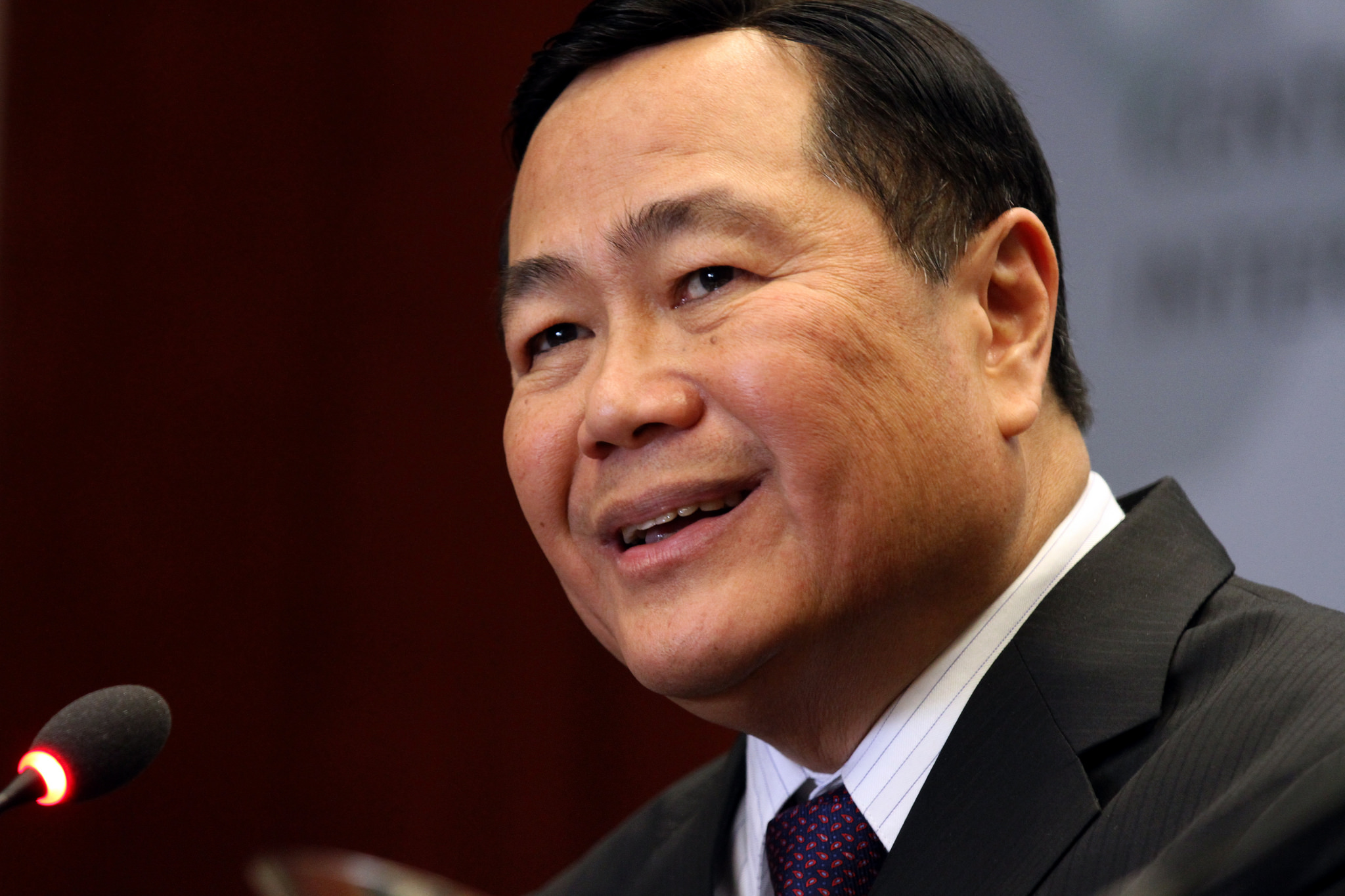Headline
Carpio says no to ‘defeatist attitude,’ gives Duterte non-war points to win vs China in WPS

In a speech before the graduates of Ateneo Law School, Carpio emphasized that “We cannot just decry the absence of an enforcement mechanism under UNCLOS (United Nations Convention for the Law of the Sea).” (File Photo: Center for Strategic & International Studies/Flickr, CC BY-NC-SA 2.0)
Supreme Court (SC) Senior Associate Justice Antonio Carpio said that the country should cannot “adopt a defeatist attitude” as he accepted the challenge of the President to come up with a “formula” to underscore the Philippines’ rights against China with regards to the dispute in the West Philippine Sea (WPS).
In a speech before the graduates of Ateneo Law School, Carpio emphasized that “We cannot just decry the absence of an enforcement mechanism under UNCLOS (United Nations Convention for the Law of the Sea).”
“We cannot adopt a defeatist attitude and just sit idly by and let China seize what international law has declared to be our own exclusive economic zone (EEZ),” he continued.
The Philippines contended China before the UNCLOS for its sovereign rights to its 200-nautical-mile EEZ and won the case on July 12, 2016, which celebrated its third year on Friday. While the tribunal has sided in favor of the Philippines and said that China has no “historic claim” based on its nine-dash line doctrine, the latter still rejected the ruling.
Carpio emphasized in his speech that the war as the only option in going against China is a “false option” and that the Filipinos should reject this idea.
“This position repeatedly reiterated by the present administration makes the Filipino people feel helpless and hopeless, makes our armed forces appear timid and useless, and denigrates the rule of law,” he said.
After many critics lambasted President Rodrigo Roa Duterte over several issues surrounding the disputed waters, the President had dared Carpio in late June to ‘give him the formula.’
“What do you think if we exchange blows there? Look at Vietnam, they attack the coast guard of China. They got a bloody nose. ‘Yan ang gawin ko (Should I do that?),” Duterte said.
He added that he is only protecting the “interest” of the country which is the lives of the Filipinos. He also said that he does not want Filipino soldiers to fight a losing battle.
Duterte then directed his statement to Carpio, saying, “Ngayon sabi ko, turuan ninyo ako paano na. Sinagot na ako ni Xi Jinping noon, there will be trouble. Kaya sagutin mo muna ako Justice, give me the formula at gagawin ko (Now, I say, teach me how. Xi Jinping already told me that there will be trouble. So answer me first, Justice, give me the formula and I will do it.)”
To this, Carpio responded, “Yes, Mr. President, there is a formula – and not only one but many ways of enforcing the arbitral award without going to war with China using only the rule of law.”
Carpio said that he hopes the Chief Executive keeps his promise to implement the ones that he mentioned.
The following are the SC’s magistrate’s options:
The Philippines together with other claimants like Vietnam, Malaysia, Indonesia, and Brunei can enter into a Convention
“This Convention will leave China isolated as the only disputant state claiming Exclusive Economic Zones from the Spratly islands,” Carpio explained.
He added that this Convention can declare that “as ruled by the arbitral tribunal, no geologic feature in the Spratlys generates an Exclusive Economic Zone and there are only territorial seas from the geologic features that are above water at high-tide.”
The Philippines can file an extended continental shelf claim in the WPS beyond the 200-nautical EEZ of the coast of Luzon.
“China cannot invoke historic rights under its nine-dashed line which has already been ruled without legal effect by the arbitral tribunal,” Carpio said.
The Philippines can patrol the WPS with the new 44-meter multi-role response vessels donated by Japan for the use of the Philippine Coast Guard.
He elaborated that these 10 vessels can help in asserting “our sovereign rights over this resource-rich maritime area in accordance with UNCLOS.”
The Philippines can tap Vietnam, Malaysia, Indonesia, and Brunei to conduct joint freedom of navigation operations in their respective EEZs.
The Philippines can encourage the Freedom of Navigation and Overflight of naval powers like the United States, United Kingdom, France, Australia, Japan, India, and Canada in Philippine waters.
Carpio said that these mentioned powers are inclined to customary international rules as well as UNCLOS rules that makes them great enforcemers of the arbitral Award.
The Philippines can support the private sector’s efforts in enforcing the arbitral Award.
He referred to the case filed by former Foreign Secretary Albert del Rosario and former Ombudsman Conchita Carpio Morales and their counsel Atty. Anne Marie Corominas as the “most creative and dramatic” of these efforts. The said case was filed before the International Criminal Court (ICC) and it accused Chinese President Xi Jinping of crimes against humanity over the environmental damage in the WPS.
“These should be undertaken together to fortify the Award part by part, brick by brick, until the Award is fully enforced,” Carpio said.





















